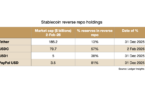Today the Financial Stability Board (FSB) published a 67-page document analyzing global stablecoins – such as Facebook’s Libra – and inviting a response to its consultation until July 15.
Last year the G20 asked the FSB to explore regulatory issues re stablecoins. Additionally, the IMF is assessing macroeconomic issues for IMF member countries, and the Financial Action Task Force (FATF) is investigating compliance with anti money laundering and counter terrorism financing (AML/CTF).
Per the G20 brief, the FSB paper doesn’t address issues of monetary policy, monetary sovereignty, currency substitution, data privacy, competition and taxation.
Article continues …

Want the full story? Pro subscribers get complete articles, exclusive industry analysis, and early access to legislative updates that keep you ahead of the competition. Join the professionals who are choosing deeper insights over surface level news.






